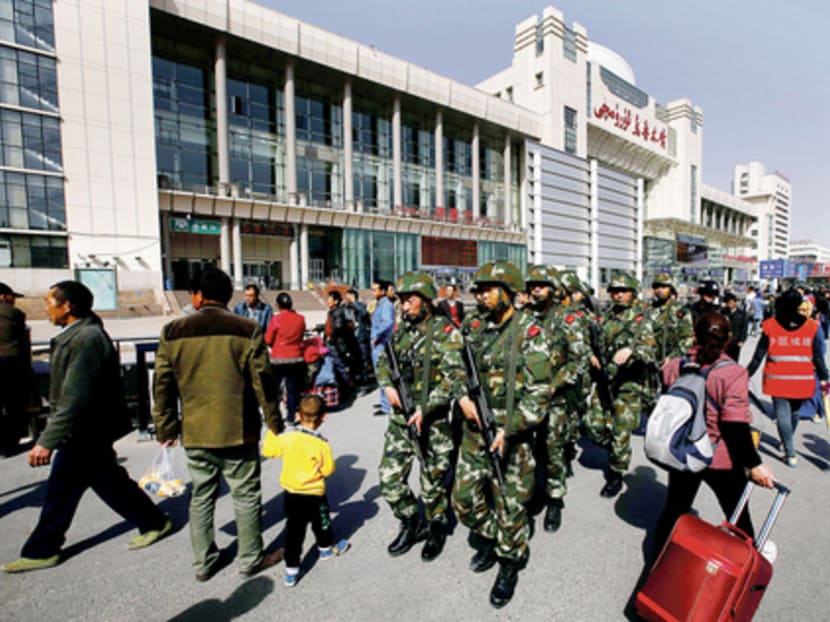Violence in Xinjiang continues despite crackdown: Beijing
BEIJING — The Chinese authorities this week released figures from their six-month report card on their security crackdown in Xinjiang, showing they had quashed 115 terrorist groups and detained 334 suspects, but tallies of death tolls in the ethnically-tense region suggest the violence has continued and may even have intensified.

Armed policemen patrolling near the exit of a railway station in Urumqi where a deadly attack occurred in May. Beijing announced a one-year security clampdown in Xinjiang that month. Photo: Reuters
BEIJING — The Chinese authorities this week released figures from their six-month report card on their security crackdown in Xinjiang, showing they had quashed 115 terrorist groups and detained 334 suspects, but tallies of death tolls in the ethnically-tense region suggest the violence has continued and may even have intensified.
Information from the region is routinely suppressed, so experts caution against any firm conclusions about the level of violence in the far-western region that is home to 10 million members of the Muslim Uighur minority, who chafe under what they consider suppression by China’s ethnic majority Han. However, both the Chinese state-run media and foreign outlets that monitor Xinjiang have continued to report a stream of deadly clashes.
“It’s safe to say that violence has continued roughly as it was before this latest crackdown, if not with greater intensity,” said Dr Rian Thum, an assistant professor specialising in Uighur history at Loyola University New Orleans in the United States.
Chinese state media outlets have reported at least 175 deaths in the past six months in eight violent incidents, including a massive attack on local government facilities that left 96 dead. That compares with 46 reported killings during the same period last year.
Dr Thum’s own tally, drawn from reports by the US government-funded Radio Free Asia, showed an even higher toll for the period, about 200 this year compared to roughly 50 the previous year.
Beijing blames the violence on separatist terrorists fuelled by religious extremism and with ties abroad, and argues that it has invested generously to boost Xinjiang’s economy and improve its quality of life. Critics attribute the violence to home-grown disgruntlement over local corruption and an influx of Hans who have brought economic development that has not equally benefited Uighurs.
In May, Beijing announced a one-year security clampdown in Xinjiang following a series of high-profile attacks on civilians blamed on Uighurs, both in Xinjiang and elsewhere. That came on top of heightened security measures in place since deadly riots broke out in the Xinjiang capital of Urumqi in 2009.
The six-month report card on the campaign, published on the Xinjiang government’s official news site, focused on prosecution data. In addition to detaining suspects, Beijing has prosecuted 294 cases of sharing online terrorism-promoting audio and video, and seized 18,000 copies of illegal religious books.
The report indicates that security remains a big problem in Xinjiang, said Mr Raffaello Pantucci, a London-based terrorism researcher at the defence think-tank Royal United Services Institute.
In the past six months, Xinjiang has also expedited the prosecution of terrorist suspects. Two-and-a-half months after assailants attacked a township government office and police station in Kashgar, the local court sentenced 12 people to death and another 15 with suspended death.
Some Uighur advocates have warned that the heavy-handed response could exacerbate tensions, but observers say the situation in the region is complex and the crackdown alone cannot be blamed for the unrest.
“The situation is tense, but there have not been substantial further attacks outside Xinjiang in recent months, so I’m not sure that things have become any worse,” said Mr Philip Potter, assistant professor of politics at the University of Virginia. AP






